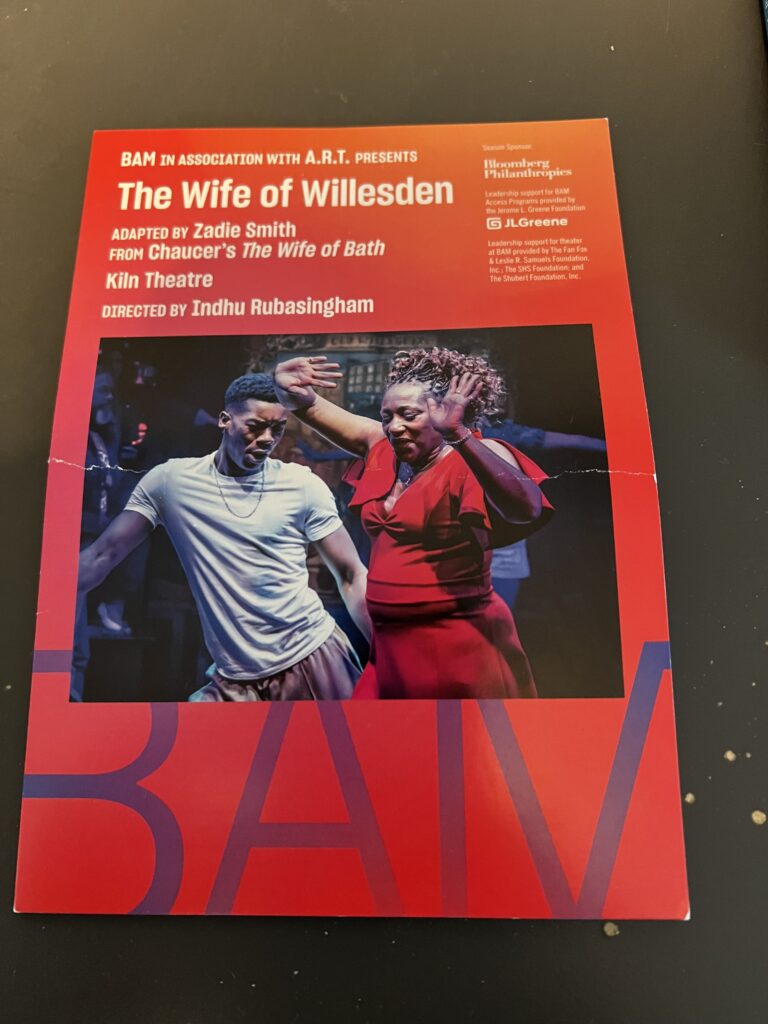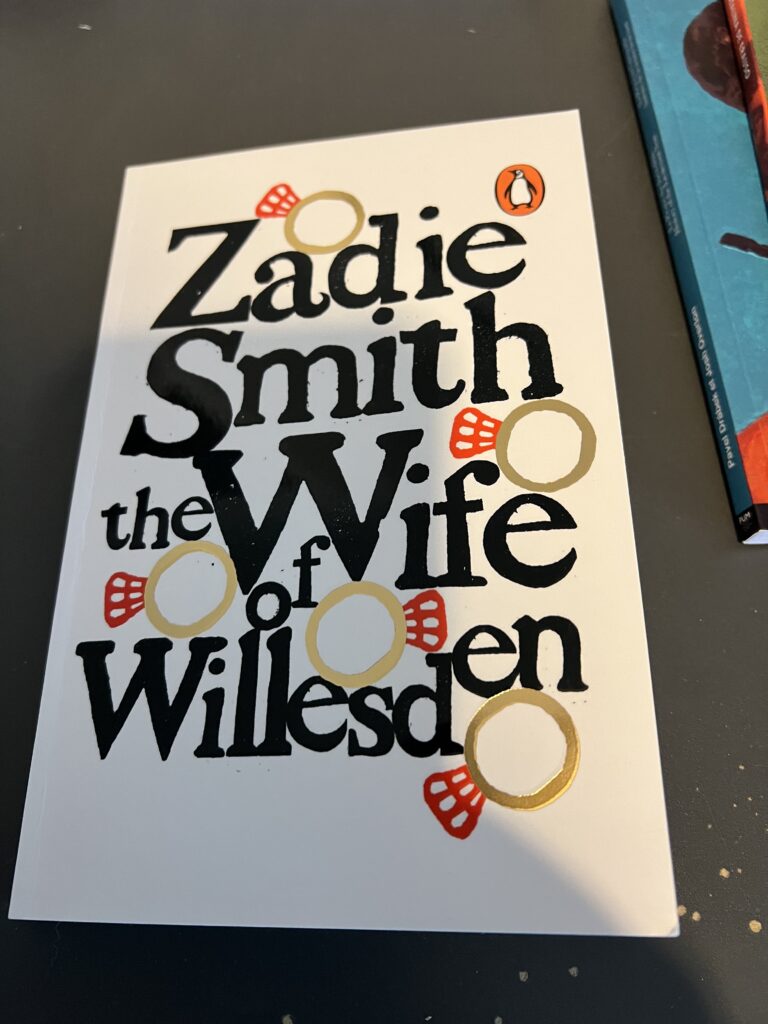As is often the case in April, the cruelest month on the academic calendar, I’ve been busily seeing as many plays as I can before I stop commuting regularly down to New York after the semester’s end. First on my mid-April lineup, though the last one that I’ll blog-review, was Zadie Smith’s homage to Chaucer, The Wife of Willesden. She translates Chaucer’s Middle English couplets into her own idiomatic, slang-y version of North London patois. It’s a funny, sometimes raunchy, dazzling show – very much in the spirit of the Wife of Bath, who has been titillating and outraging audiences since the fourteenth century.

In a busy end-of-term in which I’ve seen (and blog-reviewed!) a bunch of plays, including Arden of Faversham in March, Knight of the Burning Pestle and Fat Ham in April, I’ve almost let Wife of Willesden slip through my typing fingers. But I loved the show, and I want to post a few things about it. I am thinking about teaching a Chaucer-Zadie Smith mashup in a future survey course – especially if video snippets or the full show become available! (There is a fun 15-sec teaser on YouTube from the Boston production, which might work for classroom purposes – but no talking!)
So, reaching back a few weeks, I’ll mention just two features of this production, which I saw during its final weekend at BAM in Brooklyn. The first is the gorgeous set, an open and welcoming version of Harry Bailey’s bar, renamed the Colin Campbell pub & operated, in Smith’s North London version, by Publican Polly. Colorful shelves full of bottles arc behind the stage, but for me, sitting in the front row all the way to one side at BAM’s Harvey Theater, the most interesting visual statement was made by the tables in front of me, more or less on stage. Clearly some of them were occupied by other audience members, but farther back and to the center of the stage I saw Clare Perkins, who would play Alvita, the Wife herself, chatting with Andrew Frame, an older white man who would play Ian, her first husband (as well as, in Smith’s lively cross-casting, both Socrates and a local bailiff). Putting some audience members on stage did a nice job of blurring the fourth wall, and the sense that Alvita and her pals were performing for themselves as well as for the larger crowd of paying customers in the seats was wonderfully present. It’s a tricky thing to build a set that really invites the audience in, and I appreciated the effort by the designer, Robert Jones, and director Indhu Rubasingham.
The characters speak almost always in eloquent couplets in what Smith call “North Weezian,” a dialect from North West London, mixed with a bit of Jamaican patois, for which the program provides helpful translations. “To take the huff” means “to get offended,” “Mi dah yeh” means “everything is good,” a “pum pum” is a vagina, etc. The energy and relentless force of the writing was overwhelming – just as Chaucer’s Wife drowns out her fellow pilgrims with 800+ lines in her Prologue, so Smith’s inventive language, and Perkin’s energy and performative flair, carried the performance. I was especially struck, as I am not always when I re-read or teach the Prologue and/or the Tale, at how welcome the Tale was in this performance. Smith translated Chaucer’s Camelot to Jamaica, in the days of Queen Nanny, “Famed rebel slave and leader of peoples!” The story of the rapist knight who must quest for a year to discover, as Smith has him phrase it, “Wat women want and love the most” (79). Cross-casting Troy Glasgow as Darren, husband #2 and “A young, good-looking bwoy,” as the “young maroon” knight, and subbing in Alvita herself in place of the beautiful young woman who marries the knight in the fairy-tale ending integrated the Tale more closely to the story of Alvita herself. The maroon / Darren / Husband #2’s solution to the riddle is wonderfully apt –

You know what? You’re my girl, my wife, my love,
You blatantly know a lot about stuff.
I’ll put myself into your hands – you decide.
Choose the best thing or what makes you feel pride
In both of us. I’m easy. You do you.
If you’re into it, I’m, like, on board, too…
Wife of Willesden (102)
The sentimental reunion of Alvita and Darren doesn’t quite make Alivita a one-man wife, since the soundtrack here is Chaka Khan’s “I’m Every Woman” and in the finale she “dances will all her HUSBANDS, dead and alive” (105) – but it’s a nice moment of connection, implicit in Chaucer, visualized on stage.
I’m not sure what the plans are for future productions of The Wife of Willesden – but I suspect I won’t be the only one who wants to use this rendition in the classroom!